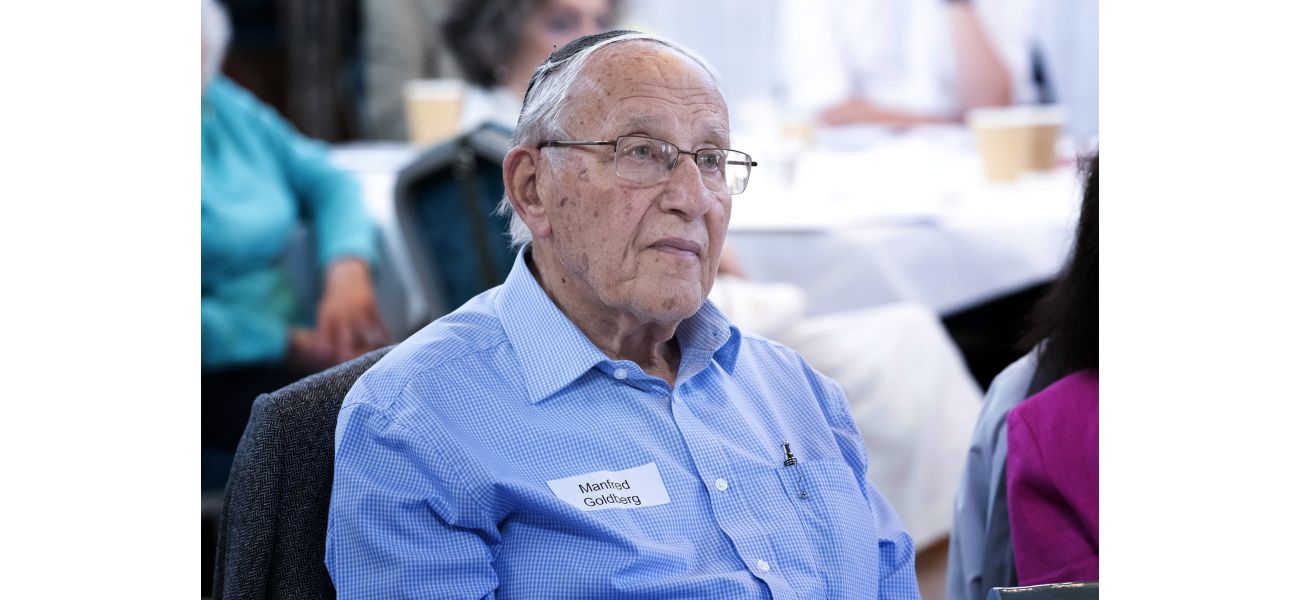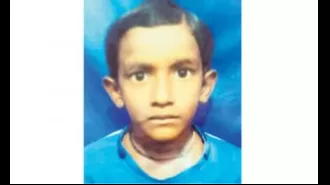I'll always remember 56478 and I've taken steps to ensure others will too.
We were informed that our names were replaced with numbers.
September 1st 2024.

I can still vividly remember the year 1945 when the Second World War tore through our country. I was only nine years old at the time, but the memories of that tumultuous period still haunt me to this day. I, along with several other Jews, resistance fighters, political opponents, and prisoners-of-war, were crammed into barges in the Baltic Sea like cattle. Every day, a cruel Nazi officer would appear, his eyes scanning our starving and terrified faces. Without any rhyme or reason, he would pick someone from the crowd and drag them up to the deck, despite their struggles and protests. We would hear the agonizing screams and the sound of a body plunging into the sea. It was a horrifying routine, with around 20 to 25 people being chosen each day to meet their gruesome fate.
As I huddled on that barge, I never could have imagined that I would survive and live to see this day. At the age of 94, it still amazes me that I made it through such a dark and uncertain time. It all began when the Jewish schools were shut down, and we were no longer allowed to enter non-Jewish shops. Food was scarce, and life became increasingly difficult for us. To make matters worse, my father had to flee to the UK after my mother fought tooth and nail to secure him a visa. But just ten days later, war broke out, crushing our plans to reunite with him.
Despite the hardships, my family and I managed to survive for two years. However, in 1941, our lives took a turn for the worse when two SS officers arrived at our doorstep. They gave my mother just ten minutes to pack a suitcase, and before we knew it, we were on a train with around 1,000 other Jews. After three grueling days, we arrived at the Riga ghetto in Latvia, a place surrounded by barbed-wire fences and filled with poverty and despair. We spent almost two years there, enduring overcrowding and starvation. It was in this place that my younger brother and I witnessed our first violent death. We watched in horror as a woman was shot for trying to hide food from the Nazis.
Things only got worse for us when we were stripped of our names and given numbers instead. We were constantly punished if we couldn't recite our numbers on demand. Mine was 56478, a number that will forever be etched in my memory. One day, in 1943, we were all rounded up and forced into cattle trucks, including my mother, my brother, and me. It took us two to three days to reach a labor camp, where I was put to work on the rail junctions, repairing the damage caused by Allied bombings.
But then, one day, my brother disappeared. We later learned that he had been taken away by two SS officers, along with three other children. We were devastated, but there was nothing we could do. The next day, my mother and I had to line up for work as if nothing had happened, but our hearts were heavy with grief. My mother never recovered from the loss of her little boy, and for years, I refused to believe that he was gone forever.
A year later, we were ordered to stand naked in front of an SS officer, who would choose who lived and who died. As we waited in a single-file line, a man behind me whispered some crucial advice. "If he asks your age, say you are 17," he said. And that's exactly what I did when the SS officer asked me my age. His question was a matter of life or death, and by claiming to be 17, I was saved from certain death. The man behind me, whose name I never learned, was my savior.
We were then formed into a long column, still naked, and marched out under the watchful eyes of armed guards. I was among the survivors, but my mother had been sent in the opposite direction, destined to die within 24 hours. It was a miracle that I made it out alive, and I still cannot fathom how I survived such a harrowing ordeal. But here I am, 94 years old, living proof that hope can survive even in the darkest of times.
I was just a nine-year-old child when the world was plunged into the chaos and destruction of the Second World War. It was the year 1945, and like many others, I found myself trapped on a barge in the Baltic Sea, along with hundreds of other Jews, political opponents, resistance fighters, and prisoners-of-war. Every day, we were terrorized by a cruel Nazi officer who would randomly select someone from our midst and force them onto the deck. No amount of pleading or struggling could save them as they were thrown overboard, their cries piercing through the air before they were silenced by the unforgiving waters. This was our reality, with 20 or 25 people being chosen each day to meet their untimely deaths in this manner.
As I huddled on that barge, my young mind could not even fathom the idea of being liberated or surviving this horrific ordeal. But here I am, 94 years later, still standing strong and sharing my story. I was just a child when the war began, and all the Jewish schools were closed. We were forbidden from entering non-Jewish shops and faced severe food shortages. It was a difficult and trying time for all of us. My father had managed to escape to the UK with the help of my mother, who tirelessly fought to secure him a visa and save him from being sent to a concentration camp. However, just 10 days after his departure, war broke out, shattering our plans to join him.
We managed to survive for two years, until one day in 1941, when two SS officers appeared at our door. They gave my mother just 10 minutes to pack a suitcase before taking us to a nearby railway station. Along with around 1,000 other Jews, we were crammed into a train and transported to the Riga ghetto in Latvia. This was a fenced-off area where the poorest residents of Riga were forced to live. We spent almost two years there, enduring severe overcrowding and starvation. It was here that my brother and I witnessed our first violent death when a woman was shot for trying to smuggle food.
Life in the ghetto was unbearable, with the Nazis stripping us of our names and assigning us numbers instead. We were constantly subjected to random searches and punishments if we couldn't recite our numbers on demand. Mine was 56478, a number that would haunt me for the rest of my life. In August 1943, we were rounded up and packed into cattle trucks, where my mother, brother, and I were separated. It took us two or three days to reach a labor camp, where I was put to work on the nearby rail junctions, repairing the damage caused by Allied bombing.
After a few weeks, my mother and I returned from work to find that my little brother had disappeared. We later learned that he had been taken away by two SS officers and never seen again. My heart was shattered, but I refused to believe that he was gone for many years after our liberation. As the months passed, we were subjected to more and more brutal selections, where we were forced to strip naked and face an SS officer who would decide our fate. It was during one of these selections that a man behind me whispered to say I was 17 if asked. Miraculously, that was the exact question the officer asked me, and I was spared.
I joined the group of survivors, still naked and vulnerable, while my mother was sent in the opposite direction, condemned to die within 24 hours. It was a heartbreaking moment that still haunts me to this day. But I will never forget the kindness of the stranger who saved my life with just a few whispered words. We were then marched out under armed guard, forming a long column of survivors, each with our own harrowing stories of survival and loss. And though I never imagined it as a young child, I am here today, aged 94, to share my story and honor the memories of those who did not make it.
As I huddled on that barge, I never could have imagined that I would survive and live to see this day. At the age of 94, it still amazes me that I made it through such a dark and uncertain time. It all began when the Jewish schools were shut down, and we were no longer allowed to enter non-Jewish shops. Food was scarce, and life became increasingly difficult for us. To make matters worse, my father had to flee to the UK after my mother fought tooth and nail to secure him a visa. But just ten days later, war broke out, crushing our plans to reunite with him.
Despite the hardships, my family and I managed to survive for two years. However, in 1941, our lives took a turn for the worse when two SS officers arrived at our doorstep. They gave my mother just ten minutes to pack a suitcase, and before we knew it, we were on a train with around 1,000 other Jews. After three grueling days, we arrived at the Riga ghetto in Latvia, a place surrounded by barbed-wire fences and filled with poverty and despair. We spent almost two years there, enduring overcrowding and starvation. It was in this place that my younger brother and I witnessed our first violent death. We watched in horror as a woman was shot for trying to hide food from the Nazis.
Things only got worse for us when we were stripped of our names and given numbers instead. We were constantly punished if we couldn't recite our numbers on demand. Mine was 56478, a number that will forever be etched in my memory. One day, in 1943, we were all rounded up and forced into cattle trucks, including my mother, my brother, and me. It took us two to three days to reach a labor camp, where I was put to work on the rail junctions, repairing the damage caused by Allied bombings.
But then, one day, my brother disappeared. We later learned that he had been taken away by two SS officers, along with three other children. We were devastated, but there was nothing we could do. The next day, my mother and I had to line up for work as if nothing had happened, but our hearts were heavy with grief. My mother never recovered from the loss of her little boy, and for years, I refused to believe that he was gone forever.
A year later, we were ordered to stand naked in front of an SS officer, who would choose who lived and who died. As we waited in a single-file line, a man behind me whispered some crucial advice. "If he asks your age, say you are 17," he said. And that's exactly what I did when the SS officer asked me my age. His question was a matter of life or death, and by claiming to be 17, I was saved from certain death. The man behind me, whose name I never learned, was my savior.
We were then formed into a long column, still naked, and marched out under the watchful eyes of armed guards. I was among the survivors, but my mother had been sent in the opposite direction, destined to die within 24 hours. It was a miracle that I made it out alive, and I still cannot fathom how I survived such a harrowing ordeal. But here I am, 94 years old, living proof that hope can survive even in the darkest of times.
I was just a nine-year-old child when the world was plunged into the chaos and destruction of the Second World War. It was the year 1945, and like many others, I found myself trapped on a barge in the Baltic Sea, along with hundreds of other Jews, political opponents, resistance fighters, and prisoners-of-war. Every day, we were terrorized by a cruel Nazi officer who would randomly select someone from our midst and force them onto the deck. No amount of pleading or struggling could save them as they were thrown overboard, their cries piercing through the air before they were silenced by the unforgiving waters. This was our reality, with 20 or 25 people being chosen each day to meet their untimely deaths in this manner.
As I huddled on that barge, my young mind could not even fathom the idea of being liberated or surviving this horrific ordeal. But here I am, 94 years later, still standing strong and sharing my story. I was just a child when the war began, and all the Jewish schools were closed. We were forbidden from entering non-Jewish shops and faced severe food shortages. It was a difficult and trying time for all of us. My father had managed to escape to the UK with the help of my mother, who tirelessly fought to secure him a visa and save him from being sent to a concentration camp. However, just 10 days after his departure, war broke out, shattering our plans to join him.
We managed to survive for two years, until one day in 1941, when two SS officers appeared at our door. They gave my mother just 10 minutes to pack a suitcase before taking us to a nearby railway station. Along with around 1,000 other Jews, we were crammed into a train and transported to the Riga ghetto in Latvia. This was a fenced-off area where the poorest residents of Riga were forced to live. We spent almost two years there, enduring severe overcrowding and starvation. It was here that my brother and I witnessed our first violent death when a woman was shot for trying to smuggle food.
Life in the ghetto was unbearable, with the Nazis stripping us of our names and assigning us numbers instead. We were constantly subjected to random searches and punishments if we couldn't recite our numbers on demand. Mine was 56478, a number that would haunt me for the rest of my life. In August 1943, we were rounded up and packed into cattle trucks, where my mother, brother, and I were separated. It took us two or three days to reach a labor camp, where I was put to work on the nearby rail junctions, repairing the damage caused by Allied bombing.
After a few weeks, my mother and I returned from work to find that my little brother had disappeared. We later learned that he had been taken away by two SS officers and never seen again. My heart was shattered, but I refused to believe that he was gone for many years after our liberation. As the months passed, we were subjected to more and more brutal selections, where we were forced to strip naked and face an SS officer who would decide our fate. It was during one of these selections that a man behind me whispered to say I was 17 if asked. Miraculously, that was the exact question the officer asked me, and I was spared.
I joined the group of survivors, still naked and vulnerable, while my mother was sent in the opposite direction, condemned to die within 24 hours. It was a heartbreaking moment that still haunts me to this day. But I will never forget the kindness of the stranger who saved my life with just a few whispered words. We were then marched out under armed guard, forming a long column of survivors, each with our own harrowing stories of survival and loss. And though I never imagined it as a young child, I am here today, aged 94, to share my story and honor the memories of those who did not make it.
[This article has been trending online recently and has been generated with AI. Your feed is customized.]
[Generative AI is experimental.]
0
0
Submit Comment





